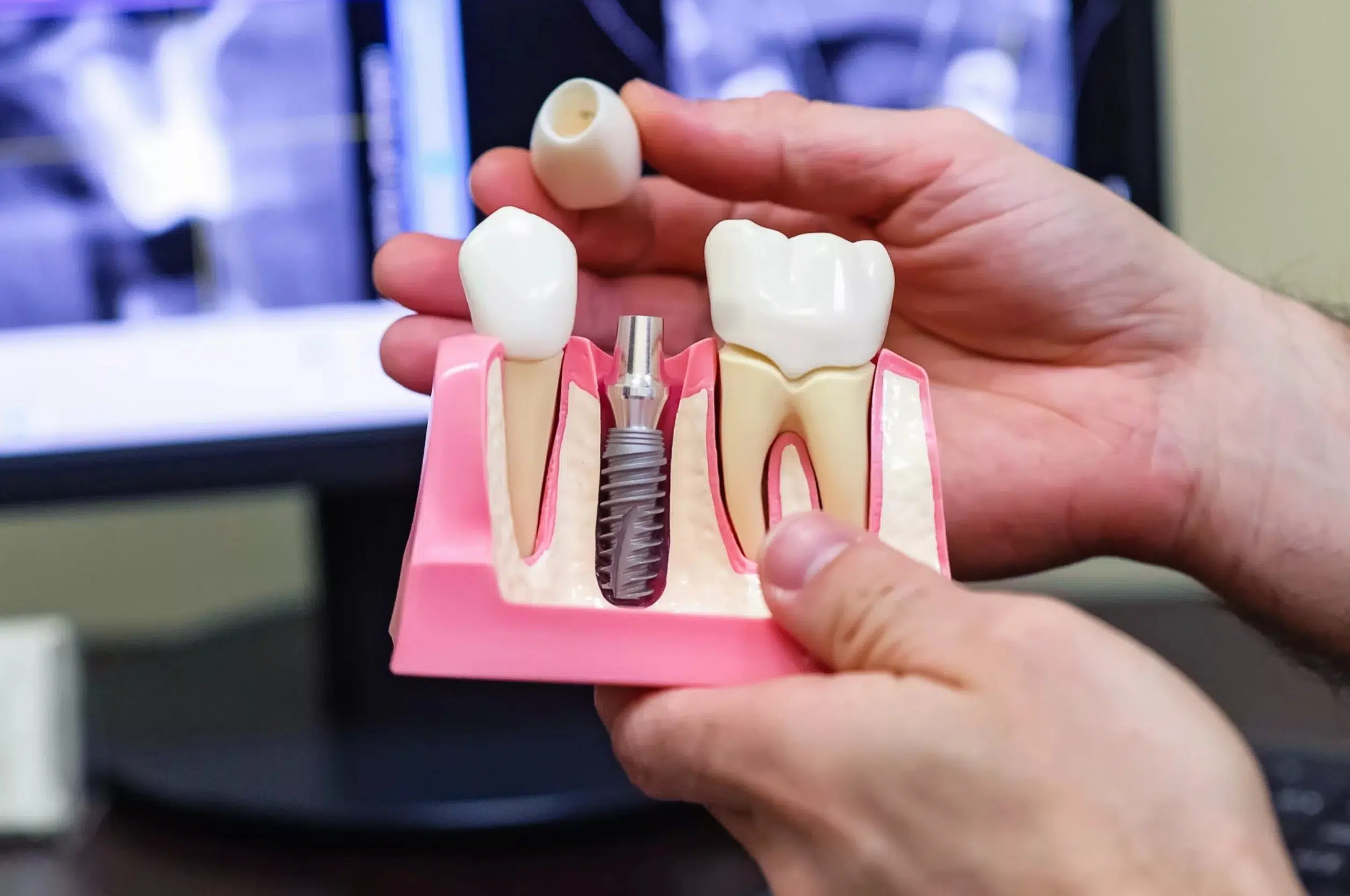Dental implants have revolutionized modern dentistry, offering a lasting solution for tooth replacement. However, the concern surrounding pain remains a significant factor that can influence individuals’ decisions. This comprehensive guide aims to address these concerns by providing an in-depth exploration of do dental implants hurt.
Brief Overview of Dental Implants
Dental implants are artificial tooth roots made of biocompatible materials like titanium. Surgically placed into the jawbone, they serve as sturdy anchors for replacement teeth. This transformative solution not only restores smiles but also ensures durability and functionality.
Importance of Addressing Concerns about Pain
Understanding and addressing concerns about dental implants hurt are crucial for ensuring that individuals considering dental implants make informed decisions. By demystifying the pain aspects, we empower patients to approach the procedure with confidence.
Thesis Statement
This guide will delve into various facets of dental implant hurt, from the initial consultation to post-operative care, providing a holistic view to help individuals make informed decisions.
Understanding Dental Implants
Explanation of Dental Implants
Dental implants are transformative solutions for tooth replacement, consisting of three main components: the implant, abutment, and crown. The implant, typically made of biocompatible titanium, is surgically placed into the jawbone, serving as an artificial root. The abutment connects the implant to the crown, the visible and functional tooth replacement. This process ensures durability and stability for adjacent teeth and prevents jawbone loss. Beyond enhancing smiles, dental implants contribute to improved oral health, making them a vital and enduring option for those seeking a natural and lasting solution for missing teeth.
Benefits of Dental Implants
Overview of the Implant Process
The dental implant process is a meticulous journey, beginning with an initial consultation and culminating in the restoration of a natural-looking smile. Following assessments and treatment planning, a biocompatible titanium implant is surgically placed into the jawbone, mimicking the function of a natural tooth root. Over several months, the implant integrates with the bone through osseointegration. The abutment, a connector, is then attached to the implant, linking it to the crown. This visible tooth replacement is custom-made to match natural teeth, completing the process. The result is a sturdy, functional, and aesthetically pleasing solution for tooth restoration.
Pre-Implant Considerations
Initial Consultations with the Dentist
Before undergoing the dental implant procedure, patients engage in detailed consultations with their dentist. This phase involves discussing medical history, assessing oral health, and outlining the treatment plan.
Assessing Individual Pain Tolerance
Individual dental implants hurt varies, and dentists take this into account when planning the procedure. A thorough understanding of a patient’s pain threshold helps tailor the anesthesia and pain management approach.
Options for Anesthesia and Sedation
To ensure a comfortable experience, various anesthesia options are available, ranging from local anesthesia to general anesthesia. Sedation methods may also be employed based on individual needs and preferences.
During the Dental Implant Procedure
Step-by-Step Breakdown of the Implant Procedure
The actual implant procedure involves several steps, including incision, drilling, implant placement, and suturing. This section provides a detailed walkthrough, demystifying the process for those considering dental implants.
Types of Anesthesia Used
Dentists employ different types of anesthesia to ensure pain-free procedures. Local anesthesia numbs the targeted area, while general anesthesia induces a temporary state of unconsciousness, ideal for more complex cases.
Patient Experiences and Testimonials
Real-life testimonials provide firsthand insights into patients’ experiences during and after the dental implant procedure. Understanding others’ journeys can alleviate anxiety and set realistic expectations.
Do dental implants hurt After the Procedure?
Expected Post-Operative Discomfort
Post-operative discomfort is normal. This section outlines what patients can anticipate in the days following the procedure, including swelling, bruising, and mild pain.
Prescribed Pain Medications
To manage post-operative pain, dentists may prescribe pain medications. Understanding the purpose and potential side effects of these medications is essential for effective pain management.
Tips for Managing Pain at Home
Patients play a crucial role in managing Dental Implants hurt at home. This section provides practical tips, including the application of ice packs, proper oral hygiene, and the recommended use of over-the-counter pain relievers.
Factors that Influencing on Dental Implant Hurts
Impact of Individual Pain Thresholds
Individual pain thresholds vary, influenced by genetic, physiological, and psychological factors. Recognizing these variations is key to personalizing the pain management approach.
Skill and Technique of the Dental Practitioner
The expertise of the dental practitioner significantly influences the level of discomfort experienced during and after the procedure. Choosing a skilled and experienced dentist is paramount for a smoother experience.
Emotional and Psychological Factors
Emotional and psychological factors, such as anxiety and fear, can amplify perceived pain. This section explores strategies for managing these factors and enhancing the overall patient experience.
Pain vs. Discomfort: Clarifying Terms
Distinguishing Between Acute Pain and Manageable Discomfort
Distinguishing between acute pain and manageable discomfort is vital in understanding the post-operative experience of dental implant procedures. Acute pain is intense and sudden, often indicating complications that require prompt attention. Manageable discomfort, on the other hand, is an expected part of the recovery process, encompassing mild pain, swelling, or bruising. Recognizing these distinctions enables individuals to communicate effectively with their dental team, fostering a realistic expectation of the healing journey. It empowers patients to identify issues that may need intervention while appreciating that some level of manageable discomfort is a normal aspect of the post-implantation recovery phase.
Patient Expectations and Communication
Effective communication and managing patient expectations are paramount to the success of dental implant procedures. Open dialogue between patients and their dental professionals establishes a foundation for understanding concerns and setting realistic anticipations. Discussing potential discomfort, recovery timelines, and possible complications fosters informed decision-making. This collaborative approach ensures that patients are well-prepared for their journey, addressing any fears or uncertainties. By cultivating transparent communication, dental teams can instill confidence in patients, creating a supportive environment where expectations align with the intricacies of the implant process. This proactive engagement contributes to a positive patient experience and successful outcomes.
Potential Complications and Pain Management
Navigating the terrain of dental implant procedures involves a comprehensive understanding of potential complications that may contribute to increased pain levels. This section aims to explore these complications and provide effective strategies for managing unexpected pain, ensuring a smoother recovery process.
Exploring Complications Leading to Increased Pain
As with any surgical procedure, dental implants may present potential complications that can intensify post-operative pain. These complications include:
- Infection: The risk of infection exists post-surgery. Timely identification and treatment are crucial to prevent heightened pain levels.
- Nerve Damage: Damage to surrounding nerves during the procedure can lead to increased pain. Monitoring and addressing nerve-related issues are vital.
- Integration Issues: Challenges with the implant integrating into the jawbone may arise. Recognizing early signs allows for proactive intervention.
Understanding these complications is fundamental for both patients and dental professionals to work collaboratively in mitigating risks and ensuring a successful implantation process.
Strategies for Managing Unexpected Pain
Swift and effective pain management is paramount in addressing unexpected discomfort during the recovery phase. Proactive strategies include:
- Medication Adjustments: Tailoring pain medications to address specific patient needs and responses is crucial for optimal pain management.
- Post-Operative Care Modifications: Alterations in postoperative care, such as adjusting dietary recommendations and oral hygiene practices, contribute to minimizing unexpected pain.
- Close Monitoring: Vigilant monitoring of the affected area allows for early detection of any signs of complications or heightened pain levels, enabling timely intervention.
Open communication between patients and dental professionals is emphasized throughout this process. Encouraging patients to report any unexpected pain promptly fosters a collaborative approach, ensuring that challenges are met with a coordinated and effective response.
Tips for Minimizing Discomfort
Pre-Operative Care Recommendations
Preparation before the dental implant procedure is crucial for minimizing discomfort. This section outlines pre-operative care recommendations, including lifestyle adjustments, proper nutrition, and oral hygiene practices.
Post-Operative Care Guidelines for Patients
Effective post-operative care significantly influences the recovery process. This section provides comprehensive guidelines for patients to follow, encompassing dietary considerations, oral hygiene practices, and scheduled follow-up appointments.
Conclusion
In conclusion, this comprehensive guide has illuminated the intricate journey of dental implant procedures, addressing concerns about dental implants hurt from initial consultations to post-operative care. By unraveling the multifaceted aspects of discomfort, individuals are empowered to make informed decisions. Understanding the implant process, potential complications and proactive pain management strategies fosters a sense of confidence. The distinction between pain and manageable discomfort, coupled with open communication, ensures a realistic approach. As we recap key points and reiterate the guide’s thesis, we encourage readers to embark on their dental implant journey with newfound knowledge, embracing a path of informed decision-making and optimal oral health.
Frequently Asked Questions








